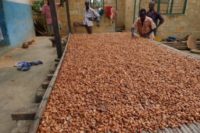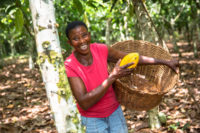The Hershey Co. announced today a new partnership with the Sugar Industry Research and Development Institute (SIRDI) to expand its Hershey Learn to Grow sustainable farming program to sugar suppliers in northern Belize.
The program will train farmers in sustainable agriculture practices to responsibly grow and harvest sugar cane. The new program builds on The Hershey Co.’s leadership in ensuring the raw materials used for its iconic brands are procured from sustainable sources where the entire community benefits from the business.
“We’ve seen great success from our Learn to Grow program in the cocoa sector and now have the opportunity to make a positive difference in the sugar industry,” says Eric Boyle, director of responsible sourcing and procurement at the Hershey Co. “The combination of our new Sustainable Sugar Sourcing Policy and the new farmer training program will give consumers the assurance that the sugar in our products is responsibly and sustainably grown and harvested.”
The SIRDI Farmer Field School, funded by Hershey, is an expansion of the highly recognized Hershey Learn to Grow program, initiated four years ago to give West African cocoa farmers the opportunity to improve productivity, raise incomes and benefit the entire community.
The Hershey Co.’s work to enhance the livelihoods of farmers within our supply chain links to the company’s heritage of sharing goodness.
Commitment to responsible and sustainable sugar sourcing
The Hershey Co. also announced today the implementation of a new Sustainable Sugar Sourcing Policy. The policy establishes rigorous standards to ensure sugar has been responsibly grown and harvested.
By 2020, The Hershey Co. will procure 100 percent of sugar purchases from responsible and sustainable sources. The company is committed to working with suppliers that not only share the same values, but are committed to action plans to adhere to the company’s Sugar Sourcing Policy.
For U.S.-sourced sugar:
-
All suppliers will be required to complete independent social audits of their refineries and other facilities to the Sedex Members Ethical Trade Audit (SMETA) standard by 2020. Suppliers will be required to address any and all non-compliances with this standard in a prompt manner and submit corrective actions for our review.
-
Hershey will conduct annual reviews of its sugar suppliers’ sustainability programs to assess the environmental impact of sugar crop farming. The results of this ongoing exercise will factor into the company’s sourcing decisions as it seeks to drive sustainability throughout its supply chain.
For international sugar:
-
Hershey will work with its suppliers to incorporate third party evaluations within their supply chains against Hershey’s Supplier Code of Conduct and industry best practices on sustainability initiatives.
-
In addition, Hershey will implement Hershey’s Learn to Grow program within its sugar supply chain, starting in Belize, to train sugar farmers on productivity and community development enhancements.








